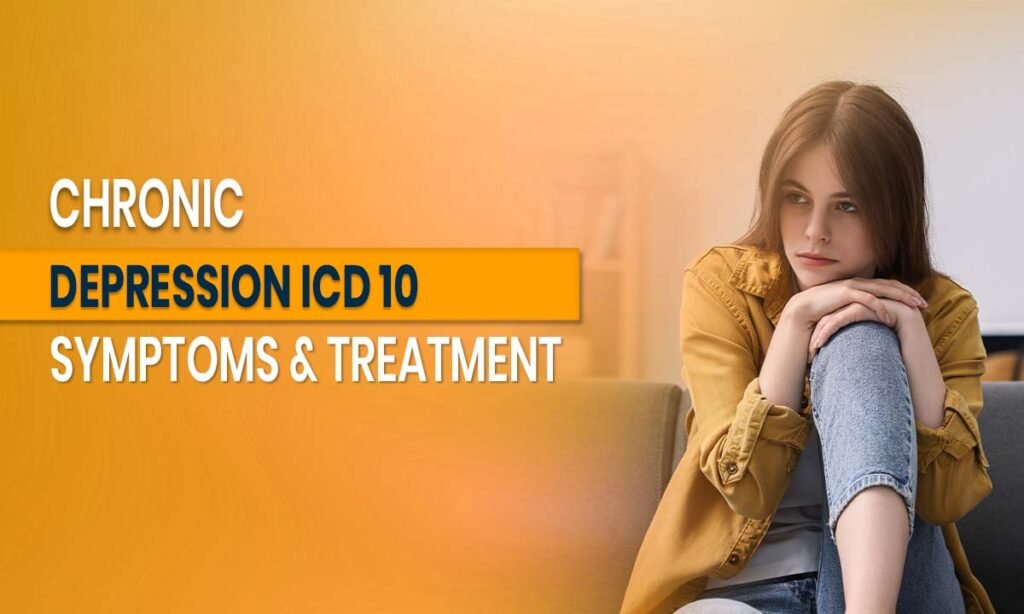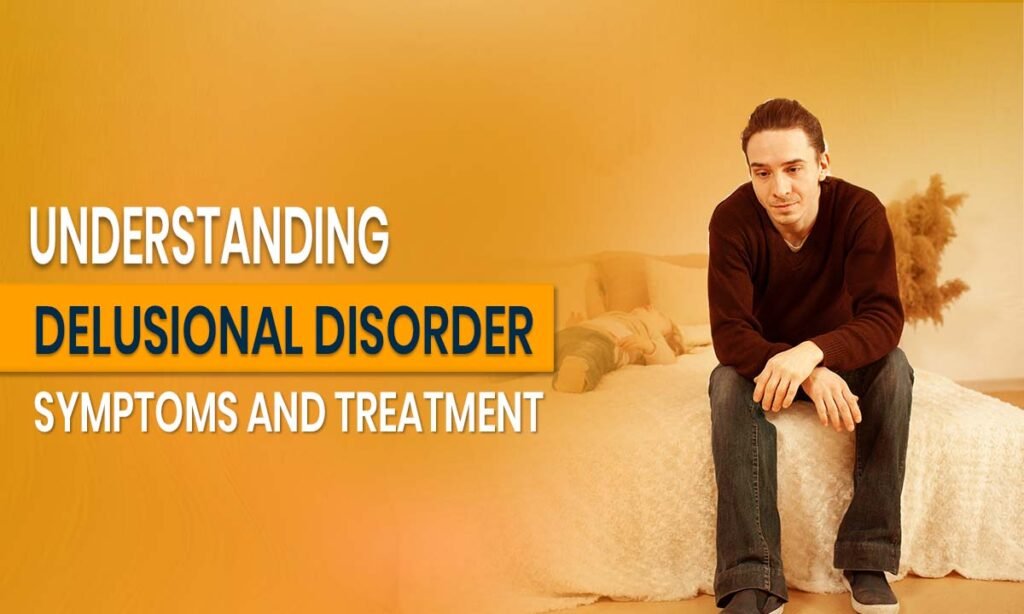
Chronic depression, as defined in the ICD-10, refers to a persistent and long-lasting form of depression. It is more than just a case of feeling “down” or “blue” for a few days—it’s a prolonged condition that can significantly affect an individual’s life. If you’re reading this article, it means you or someone close to you may be struggling with chronic depression. Today, we’ll dive into understanding the condition in-depth, including symptoms, causes, and effective treatments. It’s time to shed some light on this often misunderstood topic, so stick around until the end for valuable insights and solutions.
Chronic depression can cause serious disruptions in everyday life. People with chronic depression may experience a persistent low mood, reduced energy, and difficulties with concentration. These feelings often interfere with work, relationships, and daily activities. The key is to address it early, which is why understanding chronic depression symptoms and seeking timely chronic depression treatment is essential. At Athena Luxus, we offer luxury treatment options to help you get back on track, with a focus on mental well-being. If you are struggling, don’t wait—contact us for comprehensive support.
What is chronic depression ICD-10?
Chronic depression, known clinically as “Persistent Depressive Disorder” (PDD), is classified in the ICD-10 under the category of mood disorders. The ICD-10 diagnostic criteria for chronic depression specify that symptoms must last for at least two years, with episodes of depressed mood, reduced energy, and loss of interest in usual activities.
The difference between chronic depression and major depression lies in the duration and persistence of the symptoms. While chronic major depression ICD 10 refers to more severe symptoms that may last longer or recur, chronic depression usually presents with a lower intensity but over a longer period of time.
At Athena Luxus, we specialize in providing exclusive treatment that tailors solutions for each individual’s needs. Whether you’re experiencing chronic depression and anxiety or just dealing with one of the conditions, it’s important to seek professional guidance.
Symptoms of Chronic Depression
Chronic Depression Symptoms: A Closer Look
The symptoms of chronic depression often overlap with those of general depression but persist for a much longer period. Some of the common chronic depression symptoms include:
- Persistent low mood: Feeling sad or empty most of the time.
- Loss of interest in activities: A lack of interest in hobbies or activities you once enjoyed.
- Fatigue: Constantly feeling drained or without energy.
- Sleep disturbances: Difficulty sleeping or sleeping too much.
- Changes in appetite: Either overeating or a significant lack of appetite.
- Feelings of worthlessness: A constant sense of inadequacy or self-doubt.
Chronic depression and anxiety often go hand-in-hand, creating a cycle of emotional turmoil. If untreated, chronic depression can cause severe distress, affecting relationships, work life, and physical health. But the good news? Chronic depression can be treated.
How Chronic Depression Can Cause More Than Just a Sad Mood
Chronic depression isn’t just about feeling sad—it can have profound effects on a person’s overall health. Chronic depression can cause:
- Impaired cognitive function: Difficulty concentrating or remembering things.
- Physical symptoms: Chronic pain, headaches, or gastrointestinal issues that may worsen with depression.
- Anxiety disorders: Anxiety is commonly linked with chronic depression, often exacerbating the condition.
- Social withdrawal: Avoidance of social situations and isolation.
While these symptoms may seem overwhelming, knowing that chronic depression treatment exists can help you feel more hopeful. It is possible to overcome these struggles with the right care and support. If you’re battling chronic depression, reaching out to experts at Athena Luxus for luxury treatment can help you reclaim your life.
Chronic Depression Treatment: Finding Relief
The treatment of chronic depression involves both psychological and, in some cases, pharmacological intervention. Chronic depression treatment options may include
1. Cognitive Behavioral Therapy (CBT)
CBT is one of the most effective therapies for treating chronic depression. It helps individuals recognize negative thought patterns and replace them with more constructive ways of thinking.
2. Medication
Antidepressant medications are often used to treat chronic depression, particularly when symptoms are severe. These medications can help balance the chemicals in the brain that affect mood.
3. Lifestyle Changes
Exercise, proper sleep, a healthy diet, and stress management can significantly improve symptoms. At Athena Luxus, we offer premium support services to help you implement these lifestyle changes in a structured manner.
4. Holistic Treatments
Some individuals may benefit from complementary therapies like meditation, yoga, or acupuncture. These treatments are often used alongside conventional methods to provide a well-rounded approach to healing.
Chronic Depression and Anxiety: A Complex Relationship
Many people with chronic depression also suffer from chronic depression and anxiety disorder. Anxiety can heighten feelings of despair and restlessness, making it even harder to cope with the challenges of daily life. Anxiety often coexists with depression, intensifying the emotional strain.
At Athena Luxus, we understand how overwhelming this dual struggle can be. We provide exclusive mental health care that integrates treatments for both depression and anxiety, offering a comprehensive and supportive approach. Contact us to learn how we can support your healing journey with luxury care tailored to your needs.
Conclusion: Seek Help Today
If you or someone you know is struggling with chronic depression, don’t wait. Chronic depression and anxiety can be a lifelong challenge, but they don’t have to control your life. Seek professional help and start your journey toward recovery today. Athena Luxus offers luxury mental health treatment with a focus on treating both depression and anxiety. Contact us at +91 9718921212 to book your appointment.
If you or someone in your life is experiencing these issues, we create individualized treatment strategies to help address them. Our programs concentrate on.
Drug Addiction Treatment
Heroin Addiction Treatment
MDMA Addiction Treatment
Meth Addiction Treatment
Patient Experiences
Here’s how Athena Luxus helped some of our patients reclaim their mental health:
- Siddharth Mehta: I was battling chronic depression for years. Athena Luxus gave me the luxury treatment I needed to break the cycle. Today, I feel like a new person.
- Ayesha Sharma: The team at Athena Luxus provided me with premium care and attention. Thanks to their expertise in treating chronic depression and anxiety, my life is back on track.
- Rajeev Kumar: Chronic depression had taken a toll on me. With Athena Luxus, I received the exclusive support I needed to regain my confidence and energy.
- Priya Singh: I never thought I could manage my chronic depression and anxiety together. Athena Luxus made it possible with their holistic approach.
Frequently Asked Questions (FAQ)
What Are the Symptoms of Chronic Depression?
Chronic depression symptoms include persistent sadness, low energy, sleep disturbances, and feelings of hopelessness that last for two years or longer.
How Long Is Chronic Depression?
Chronic depression lasts for at least two years, but it can last much longer if left untreated.
Is Chronic Pain a Symptom of Depression?
Yes, chronic pain, such as headaches or joint pain, is a common symptom of chronic depression. This physical discomfort can worsen with the emotional toll of the condition.
How to Diagnose Chronic Depression?
Chronic depression is diagnosed through a combination of physical assessments, patient history, and psychological evaluations. A mental health professional can help assess and diagnose the condition.
Is Chronic Depression Curable?
While chronic depression may not have a “cure,” it is highly treatable. With the right support, individuals can manage symptoms and lead fulfilling lives.

